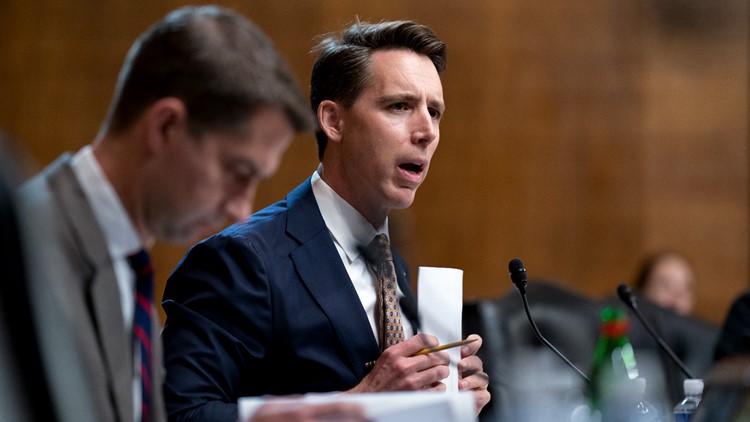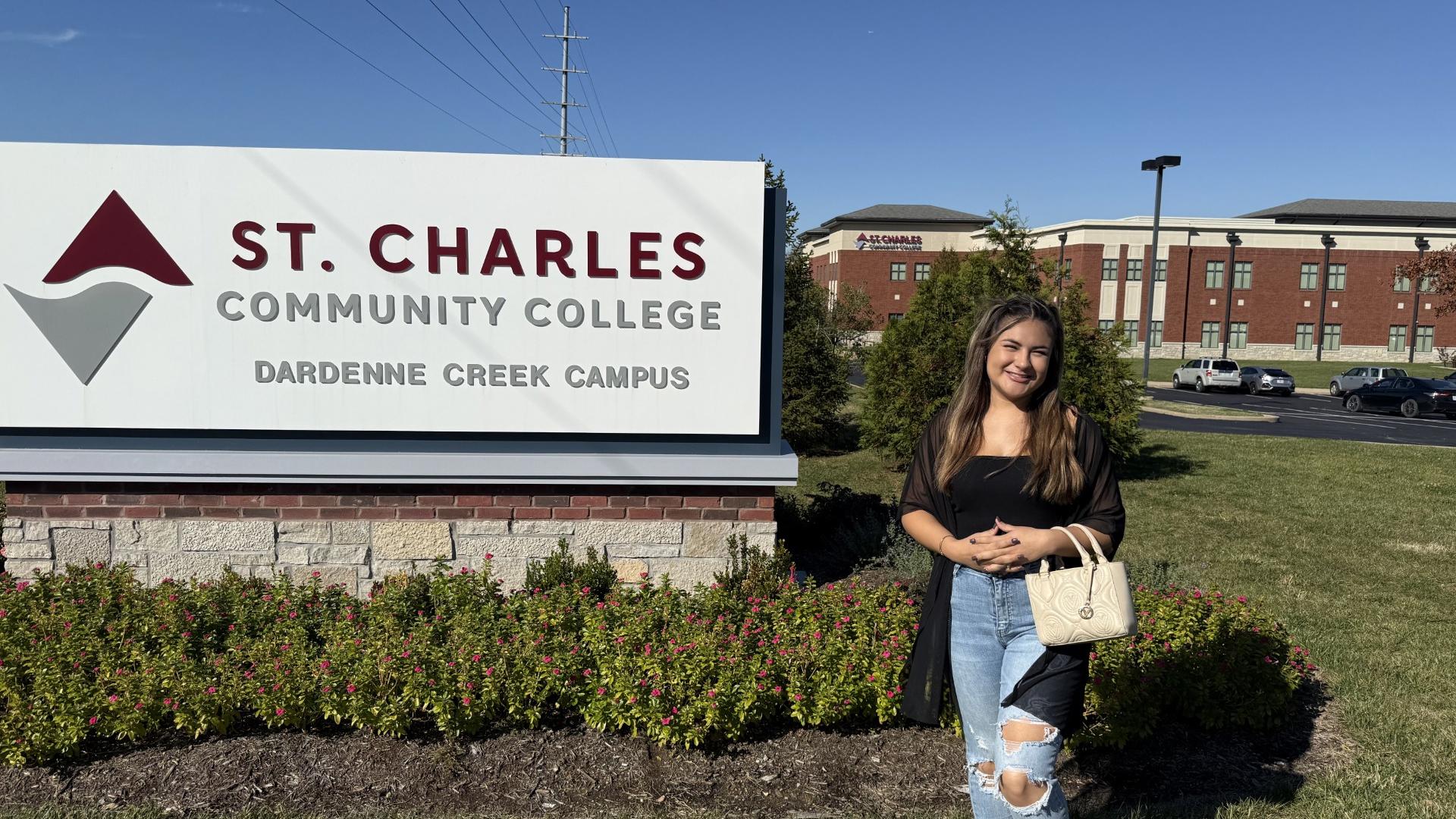ST. LOUIS — In the wake of the mass school shooting in Uvalde, Texas, U.S. Senator Josh Hawley (R-Missouri) renewed calls for tougher criminal penalties and higher funding levels for police.
Hawley suggested he would oppose expanding federal firearm background checks to private sales between "family and friends." He also claimed research that shows higher criminal penalties don't deter violent crime was "absolutely wrong."
Below is an unedited transcript of Senator Hawley's interview with 5 On Your Side's political editor Mark Maxwell:
Mark Maxwell: In the wake of the Texas School shooting, you wrote in part that "...the time has come to increase penalties for violent crimes and crimes committed with firearms." Texas already has the death penalty for what the school shooter did. What could be a tougher penalty than that?
Senator Josh Hawley: Well, I've talked about federal law. Obviously, I can't change the law in Texas. But at the federal level, I think we need to increase the mandatory minimum sentences for violent crimes, for crimes that are committed with firearms, or for attempted crimes and attempted use of firearms, including bringing the firearm to the scene of a crime. I mean, listen, the crime wave, unfortunately, is not just about this one school in Texas. We're seeing shootings, we're seeing murders, we're seeing carjackings, we're seeing assaults in across state of Missouri and all over the country. And I think that to the extent that we can address this at the federal level, when you talk about looking at the federal crimes that are on the books, and actually doing something to give federal prosecutors the ability to send a message and get violent criminals off the streets, we should do it. And that's where I would start.
Maxwell: But before you can punish a criminal, you have to catch them. And the point of the question, really, was that research and study after study shows tougher penalties don't actually deter crime. Have you reviewed that research? And do you find it credible?
Hawley: Yeah, that's absolutely wrong. I mean, if you look at the statistics in the United States, when we increased penalties for violent offenders, when we increased sentences, crime went down in this country. It went down for decades in this country. And what we've seen is over the last couple of years, as liberal jurisdictions, and including, unfortunately, the federal government, the actions of Congress, as they've gotten softer on crime, as we've seen DAs, including right there in St. Louis, who won't prosecute violent offenders, what happens? Crime goes up. And I frankly think people are tired of hearing that it's always 'point the finger to somebody else.' You know, 'Oh, well, you know, it's not on us to prosecute the criminals.' 'Oh, prosecuting the criminals doesn't work.'
I mean, maybe we should defund some of these liberal prosecutors if they're not going to go out there and do their jobs. I can just say, as a parent, I want criminals prosecuted. Somebody threatens my kids, I want them prosecuted. Somebody brings a gun to a crime, I want them behind bars. And I'm tired of hearing excuses about why it will or will not work. We know it works. So these people should start doing their jobs.
Maxwell: I think the question was rather than to prosecute them, you have to first catch them and that closure rates are not high enough. What can we do as a country, as a society, to increase the likelihood that criminals get caught in the first place?
Hawley: Well, I mean, one thing we can do is increase funding for the police. I mean, now we're seeing the result of this terrible idea of defunding the police, of taking away their resources, we should do just the opposite.
This is why I've said now for over a year, we should put 100,000 more cops on the street, new cops on the street, in addition to what we already have. We ought to give every cop in Missouri and around the country a pay raise. We ought to give them the resources that we need.
We saw another potential mass shooting in Texas be thwarted just in the last 24 hours because cops were able to identify somebody talking about potentially shooting up people online. That's great. But cops need more resources. And also we need to share information across different law enforcement agencies.
I can just tell you from my time as attorney general, a lot of times what one law enforcement agency has -- and usually that's the feds, the FBI -- they might be tracking someone who's a person of interest, but local law enforcement who are first line of defense don't know about it. So we've got... To your question about how do you catch them, we've got to improve and facilitate the sharing of information among those law enforcement agencies. And we've got to give our law enforcement more resources.
_________________________________________________
Maxwell: I can appreciate a conversation, a policy discussion, about punishing and prosecuting criminals, but there's also one right now about preventing mass shootings like this. If you have to be 21 to buy a beer, should you have to be 21 to buy an AR 15?
Hawley: Well, you're talking about a long gun, right? I mean, that's a rifle. An AR 15 is just a style of rifle. And I think that that's a decision for the states. I mean, I would not set a federal policy on that. So I think that the states can can make up their own minds about it. I personally don't favor it. But you know, the states can do as they as they choose.
Maxwell: What's wrong with expanding background checks?
Hawley: Well, expanding to mean what? To include family and friends?
Maxwell: I mean to include personal, private sales, transfers...
Hawley: Yeah, that's family and friends.
Maxwell: Well, if you're doing one-off, that's one thing, but if you're doing five or more a year, maybe you're in the business.
Hawley: Well, I mean, my concern about including family and friends is that you know, if my uncle wants to sell me a gun, and he's not a dealer, but he's got a gun I'd like to buy, I want to buy his shotgun, I want to buy his rifle, you know, whatever. I don't think that it makes sense to make them go through a federal background check. I mean, I just think that that's, I think, frankly, it's intrusive, and I think it's unnecessary. My view is if you're a dealer, then you ought to have to get a license, and you ought to have to fully comply. And that is the law right now. So my view is is that that's about the right balance. I don't think that, again, forcing family members to do it when they want to give their guns, or loan their guns, or what have you, to other family members, I just don't think that makes sense. I mean, it wouldn't have had any effect, as we know, in this case, sadly.
Maxwell: I read that it might have in Buffalo. And certainly, it's not about preventing every single crime but increasing the likelihood that these are not going to happen, these mass shootings, as frequently.
Hawley: Yeah, see, now this is my same point. I'm glad you raised it and phrased it that way. This is my point about increasing prosecutions, because what we're talking here is about a deterrent effect. And I'll just say this, that for these folks who are contemplating doing this, for whatever reason for the attention, for the sick glory of it, you know, the glorification of social media, all of that garbage. I mean, if your thought is, 'You know, what, I might have to spend my life in prison or I might get the death penalty,' to your earlier point... I don't know. I think that that would have an effect. And we've seen that it has in the past. If you increase prosecutions, crime goes down. We see it happen in this country. So once again, I come back to the fact that as a former prosecutor, and as a parent, to keep our kids safe, start putting these people behind bars and start putting people who attempt to commit these crimes behind bars.



